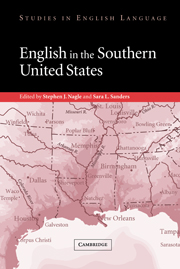Book contents
- Frontmatter
- Contents
- Notes on the contributors
- Acknowledgments
- Introduction
- 1 The origins of Southern American English
- 2 Shakespeare in the coves and hollows? Toward a history of Southern English
- 3 Eight grammatical features of southern United States speech present in early modern London prison narratives
- 4 The shared ancestry of African-American and American-White Southern Englishes: some speculations dictated by history
- 5 The complex grammatical history of African-American and white vernaculars in the South
- 6 Grammatical features of southern speech: yall, might could, and fixin to
- 7 Sounding southern: a look at the phonology of English in the South
- 8 Vowel shifting in the southern states
- 9 Enclave dialect communities in the South
- 10 Urbanization and the evolution of Southern American English
- 11 The Englishes of southern Louisiana
- 12 Features and uses of southern style
- References
- Index
1 - The origins of Southern American English
Published online by Cambridge University Press: 22 September 2009
- Frontmatter
- Contents
- Notes on the contributors
- Acknowledgments
- Introduction
- 1 The origins of Southern American English
- 2 Shakespeare in the coves and hollows? Toward a history of Southern English
- 3 Eight grammatical features of southern United States speech present in early modern London prison narratives
- 4 The shared ancestry of African-American and American-White Southern Englishes: some speculations dictated by history
- 5 The complex grammatical history of African-American and white vernaculars in the South
- 6 Grammatical features of southern speech: yall, might could, and fixin to
- 7 Sounding southern: a look at the phonology of English in the South
- 8 Vowel shifting in the southern states
- 9 Enclave dialect communities in the South
- 10 Urbanization and the evolution of Southern American English
- 11 The Englishes of southern Louisiana
- 12 Features and uses of southern style
- References
- Index
Summary
Introduction
The origins of Southern American English can be found on the islands off the shore of the Netherlands and in northern Germany and southern Denmark (where English speakers dwelled before they crossed the channel to invade the British Isles) or, to go back a bit further, on grassy plains somewhere in mid Eurasia (where the Proto-Indo-European-speaking peoples had their Urheimat) and, even before that, perhaps in the Great Rift Valley of East Africa (where Homo sapiens may have originated). That is, Southern American English has the same origins as all other dialects of English, all Indo-European languages, and maybe all human languages.
To be sure, such answers to the question “What are the origins of Southern American English?” go deeper into origins than the question normally asks for. But it is important to keep in mind that, when we talk about the “origins” of anything, our talk is always relative to other things and times. To ask about the “origins” of a speechway like Southern presumes that it popped into existence at some point as a departure from another speechway.
But all language is always changing, so every état de langue is at every moment a departure from what it used to be. Southern did not depart from “general” American, much less early Modern English or Proto-Germanic or Proto-Indo-European or Proto-Human. Like the galaxies of the cosmos, all languages are flying apart from one another, and there is no center.
- Type
- Chapter
- Information
- English in the Southern United States , pp. 6 - 16Publisher: Cambridge University PressPrint publication year: 2003
- 2
- Cited by

